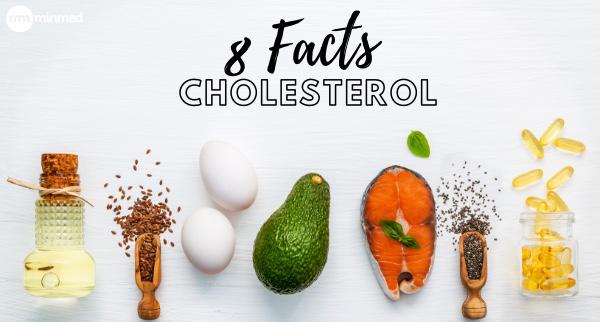8 Truths About Cholesterol

1. Cholesterol does not only come from food.
Most of us will link high cholesterol with unhealthy diet habits. Our body produces approximately 1000mg of cholesterol in our body daily. This amount is needful for cell development, digestion, vitamin and hormonal production. Most cells in our body produces cholesterol but our main export is the Liver. In the liver, cholesterol gets produced, metabolised and recycled.
2. Our body needs cholesterol.
Some essential functions of cholesterol include:
- Produce outing layer of our cells
- Form bile acids to emulsify fats in the intestine
- Help body to make Vitamin D and hormones (estrogen for female, testosterone for male)
3. There are 2 main types of cholesterol. Good and Bad.
Cholesterol are not water soluble and needs to be carried by protein known as lipoprotein. There are 2 types of cholesterol, “Low-Density Lipoprotein” which is known as bad cholesterol and “High-Density Lipoprotein” which is known as good cholesterol.
Low-Density Lipoprotein (LDL) – It carries cholesterol around the body and deposits them in the arteries.
High-Density Lipoprotein (HDL) – It carries cholesterol to the liver where it can be removed from your bloodstream before it builds up in your arteries.
4. Saturated and Trans fats in food can cause high cholesterol.
The types of fats we consume are important as it play an important role in increasing or decreasing cholesterol in our blood stream. Saturated fats can be found meat, milk, ice cream and oils like coconut oil, palm kernel oil, and palm oil. These oils will be semi-solid at room temperature. Many snack foods and fried foods are also rich in saturated fat. It raises the total cholesterol in the body.
Trans fats are made through a process called hydrogenation. This process adds hydrogen molecules to the vegetable oil to make it more saturated and more solid. Trans fats can make food taste better with good texture. Trans fats can be found in most processed food such as margarine, cookies, chips, cakes, fries, donuts and many more. It raises the bad “LDL” cholesterol and decreases the good “HDL” cholesterol. Limiting the amount of fats in your diet and choosing healthier fats can help to control the cholesterol level in our body.
5. MUFA and PUFA can help to control cholesterol level in our body.
Eating food such as nuts, grains, oily fish (sardine, salmon, mackerel) which contain high amount of Polyunsaturated Fats (PUFA) can help to lower blood cholesterol. Aside, you may like to choose oil such as olive, canola, sesame, almonds and avocado which contain high amount of Monounsaturated Fats (MUFA) can help to increase HDL levels.
Vegetables, fruits and wholegrain contains small amount of plant sterols. The structure of plant sterol is similar to cholesterol from animal products. As such, they interfere with the cholesterol absorption and lower cholesterol levels. Other than sterols, vegetables, fruits and wholegrains have large amount of soluble fibre that can help to bind cholesterol in the gut to reduce absorption of cholesterol into the body.
6. High Cholesterol can cause detrimental complications.
High cholesterol is dangerous as it may be deposited along the walls of the arteries leading to plaque built up (Atherosclerosis). Such these plaques build up, it reduces the blood flow through the arteries. With reduced blood flow to the heart, chest pain may happen. When a plaque ruptures and blood clot is formed, it blocks the flow of blood to the heart, resulting in heart attack. When the blood clot happens in the brain, it blocks the blood flow to the part of the brain, leading to stroke.
7. High Cholesterol can be genetic.
In most people, leading a healthy diet and regular exercise can maintain good cholesterol levels. In some cases, genes may be the contributing factor to high cholesterol in body. A genetic condition known as Familial Hypercholesterolemia (FH) where a person inherit 1 or 2 abnormal chromosomes can make the liver difficult to regulate LDL levels, resulting in high cholesterol. People with such condition are at higher risk to premature heart disease caused by the plaques narrowing the arteries.
8. High Cholesterol can be treated.
High cholesterol can be treated by having a healthy diet and exercising regular for at least 30 minutes 5 times a week. However, people with Familial Hypercholesterolemia (FH) can eat a healthy low-fat diet but still unable to regulate their cholesterol. Cholesterol will be built up in the blood stream regardless of what is consumed. In such cases, doctor may prescribe cholesterol-lowering medication to control the cholesterol level. Medication such as statin blocks an enzyme that produces cholesterol in the liver and increases the body’s ability to remove cholesterol from the blood stream. LDL cholesterol can be reduced up to 50% or more in such therapy.
There are many other therapies that treats FH. In serious cases, LDL apheresis may be used. In apheresis, patient’s blood will be put through a machine to remove LDL cholesterol and put the cleaned blood back into the body. It must be done several times in a month to maintain the cholesterol in the blood.
All in all, high cholesterol is dangerous especially when it does not have any symptoms. Get yourself checked, we do not want to wait for complications to kick in before it gets too late.


